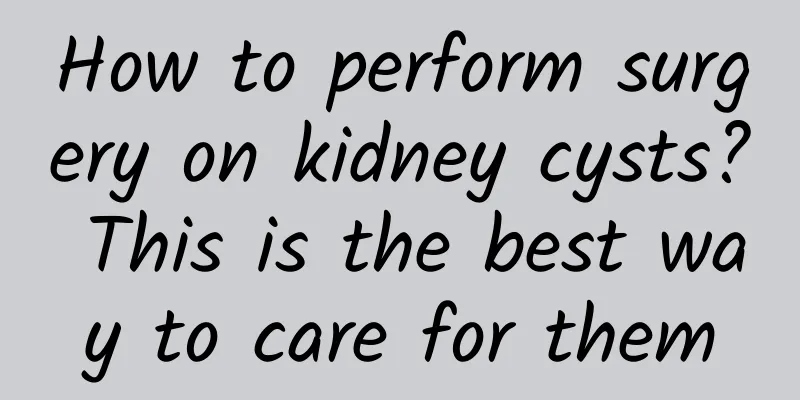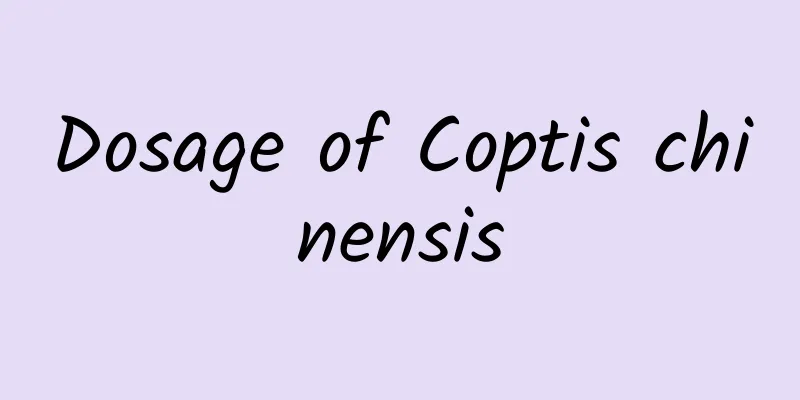How to perform surgery on kidney cysts? This is the best way to care for them

|
From the perspective of clinical treatment effects, laparoscopy is the best method for treating renal cysts. It does not enter the abdominal cavity, causes less disturbance to the abdominal organs, has the advantages of less trauma and faster postoperative recovery. Patients can walk and move around the next day after surgery. In recent years, it has become the preferred surgical method for renal cysts. 1. Surgical treatment Most scholars believe that simple renal cysts, such as cysts with a diameter greater than 4 cm, low back pain, hematuria, recurrent infection, obvious compression of the renal parenchyma or renal pelvis and calyx, as well as hypertension, compression of the ureter by the lower pole cyst, leading to obstruction and suspected malignant transformation, are all indications for treatment. The treatment methods include: 1. Renal cyst puncture and fluid extraction under B-ultrasound monitoring + Injection of anhydrous alcohol or other sclerosing agents, but there is a risk of spillage and possible absorption of sclerosing agents, which may damage the kidneys or cause serious complications. 2. Open surgery causes greater trauma, slow recovery, affects physical labor, and has poor patient acceptance. 3. Use retroperitoneal laparoscopic technology to perform renal cyst decompression surgery. Only three small holes need to be made in the waist to establish a laparoscopic channel and perform the surgery with a laparoscope. It does not enter the abdominal cavity, causes less disturbance to the abdominal organs, has the advantages of less trauma and faster postoperative recovery, and the patient can walk and move around the next day after surgery. In recent years, it has become the preferred surgical method for renal cysts. 2. How to take care of renal cyst after surgery? 1. Diet Patients with renal cysts should be careful not to eat salty foods (including pickled foods) or spicy foods after surgery. (including chili peppers, alcohol, shrimps, crabs, etc.), do not eat contaminated food (including rotten and spoiled food, leftovers, etc.), do not eat barbecued food, and those with renal insufficiency or uremia should also avoid eating beans and their products, limit animal high-protein foods, greasy foods, etc. 2. Patients with renal cysts should maintain an optimistic attitude and build confidence in overcoming the disease. Cystic diseases are the result of the interaction of various congenital and acquired factors. Scientific research has found that all these factors can be changed or controlled and eliminated. Therefore, patients with renal cysts must not be pessimistic or disappointed. Moreover, optimistic thoughts and emotions can enhance human immunity and help overcome renal cystic disease. On the other hand, patients with renal cysts must overcome the mentality of "underestimating the enemy" and actively cooperate with professional nephrologists for treatment. Being optimistic and taking things seriously is the correct guiding ideology. 3. Patients with renal cysts should pay attention to rest after surgery Patients with renal cysts should avoid strenuous physical activities and abdominal trauma after surgery. When the kidney is obviously enlarged, a sling should be used instead of a belt to avoid cyst rupture. Generally, a review should be conducted every six months (including blood pressure, urine routine, renal function and B-ultrasound). All nephrotoxic drugs should be avoided. Relatives (parents, siblings and children) should undergo B-ultrasound examination. 4. Patients with renal cysts should use medication scientifically Patients with renal cysts should consult their doctor in detail before taking medication, and after the doctor's diagnosis, use the medication according to the prescription to achieve both symptomatic and root cause treatment, which will have obvious effects. Avoid taking medications that are toxic to the kidneys without your doctor's approval. What are the types of renal cysts? 1. Simple renal cyst It may be a congenital abnormality, with one or both kidneys having one or more round cystic cavities of varying sizes that are not connected to the outside world. Most of them are unilateral, so it is called simple renal cyst. The incidence rate may increase with age. 50% of people over 50 years old can be found in this cyst by B-ultrasound. It can be diagnosed with the help of B-ultrasound and CT. 2. Adult renal cyst Adult renal cysts are a congenital genetic disease in which the renal parenchyma is filled with countless round renal cysts of varying sizes that are not connected to the outside world. Symptoms include increased nocturia, low back pain, high blood pressure, etc. Urinalysis may reveal hematuria and a small amount of proteinuria, which often slowly develops into chronic renal failure. 10% of people have kidney stones and 30% have polycystic liver disease. An experienced doctor can confirm the diagnosis with the help of B-ultrasound and intravenous pyelography. 3. Acquired renal cyst It mainly occurs after uremia or dialysis treatment. It has nothing to do with age, but is related to the duration of hemodialysis. The kidneys originally do not have renal cysts. According to literature reports, most patients who have been on dialysis for more than 3 years will develop cysts. There are at least 4 cysts in one of its kidneys. Some cysts can become infected or even cancerous, which can be confirmed by ultrasound or CT scans. I hope everyone will pay attention to the characteristics of this disease, and be sure to have a reasonable diet. At the same time, you should also pay attention to getting more rest, avoid excessive fatigue, and effectively enhance your physical fitness. You should also pay attention to your own health and make a reasonable diagnosis to avoid causing serious diseases. I hope that patients can be cured as soon as possible to avoid more troubles. |
<<: Couples massage, four steps to climax quickly
>>: Five essential methods of TCM treatment for renal cysts
Recommend
The root cause of body odor is dampness and heat
Body odor is quite common in our daily life, and ...
Can calf raises slim your calves?
Heel raises can lift and stretch the calf muscles...
What is cortical hyperplasia?
I believe everyone has heard of cortical hyperpla...
What is organic disease?
Organic diseases refer to diseases that occur in ...
How to treat acute cerebral infarction? Two methods are very effective
Clinically, during the acute phase of cerebral in...
What ointment is good for peeling fingers
With the worsening of water pollution, some disea...
What to eat for whitening and tender skin? These foods make you more tender the more you eat
Every woman hopes that her skin can always be fai...
Purpose of bladder irrigation
The purpose of bladder irrigation is to eliminate...
Is Meniere's syndrome hereditary?
Meniere's syndrome has a certain relationship...
The fastest way to cure a sore throat
Each of us will encounter the disease of sore thr...
How to quickly get rid of bad breath in girls
Bad breath is a common phenomenon among girls, wh...
How to hold urine quickly during B-ultrasound examination
B-ultrasound examination is a very common examina...
What does traditional Chinese medicine say about facial red blood streaks?
We all know that traditional Chinese medicine is ...
Is drinking brown sugar water effective for low blood pressure?
Low blood pressure is often prone to dizziness an...
What are the effects of Isatis indigo leaf
Many people have not heard of this medicine, but ...









